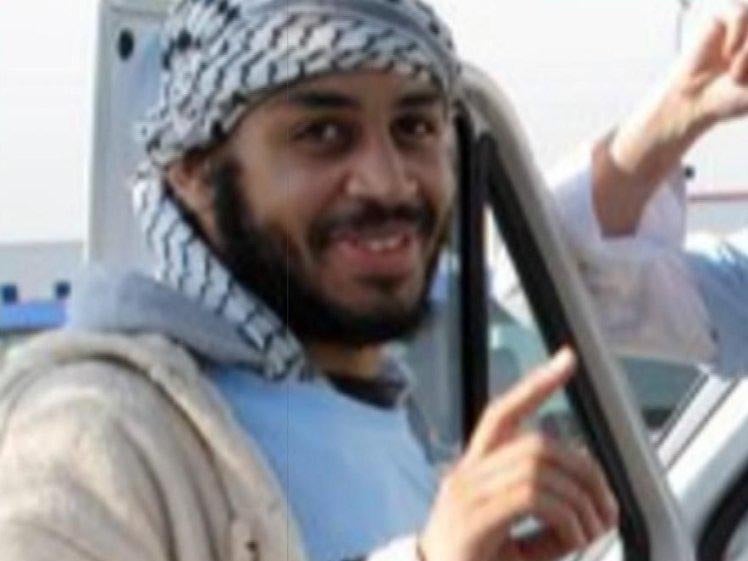Isis militants hunted down in Syria after intelligence extracted from captured members of 'The Beatles' cell
American authorities vow to hold Alexanda Kotey and El Shafee Elsheikh 'accountable' for crimes

Intelligence extracted from two British Isis militants captured in Syria has already sparked operations hunting other jihadis down, security sources have told The Independent.
Alexanda Kotey and El Shafee Elsheikh were the last two members of the British Isis cell known as “The Beatles” to remain at large until they were detained by the Syrian Democratic Forces (SDF) last month.
They were wanted for involvement in the torture and execution of hostages including the American journalist James Foley and British aid workers David Haines and Alan Henning, whose families have hailed the first step towards justice for their loved ones.
Kotey and Elsheikh have been interrogated while in custody, while diplomats in London and Washington are understood to be in discussions about where they will be taken next.
One of their former hostages says he wants them to be given a fair trial, while calling on the US not to detain the jihadis at Guantanamo Bay.
The defence minister, Tobias Ellwood, also argued that the men should be tried in the International Criminal Court in The Hague, rather than being sent to the US detention camp in Cuba.
Security sources told The Independent information provided by Kotey and Elsheikh has already led to a number of operations hunting down Isis fighters.
Officials hope that further investigations may generate leads on what happened to remaining hostages including the British journalist John Cantlie, who disappeared after appearing in a series of Isis propaganda videos. It is also hoped that they may yield information about the whereabouts of their victims' bodies.
Elsheikh and Kotey are among hundreds of foreign fighters captured by the SDF as it drives militants out of their self-declared “caliphate”, with biometric tests used to identify suspects.
Intelligence agencies had planned to capture the pair alive after killing “The Beatles” ringleader Jihadi John, whose real name was Mohammed Emwazi, in a 2015 drone strike, recognising their value in potentially providing intelligence.
The fourth militant in the cell, Aine Davis, has been jailed for terror offences in Turkey and information from his interrogations has been passed to Washington and London.
The US military vowed to hold Kotey and Elsheikh accountable for their crimes, although it remains unclear which country will assume responsibility for any prosecutions.
Eric Pahon, a spokesman from the US Department of Defence, told The Independent: “We are still considering options regarding Elsheikh and Kotey, but rest assured our intention is to hold anyone accountable who commits acts like those they are alleged to have committed.”
Both men were declared “specially designated global terrorists” last year for their roles in the group, with officials holding the cell responsible for beheading more than 27 hostages and torturing many more.
A small number of captives, including French journalist Nicolas Henin, were freed and have told of the British militants’ brutality.
Elsheikh, 29, was said to have earned a reputation for waterboarding, mock executions and crucifixions while serving as a jailer, while fellow guard Kotey was involved in beheadings and known for “exceptionally cruel torture methods”, including electronic shocks.
Syrian Democratic Forces take Raqqa from Isis – in pictures
Show all 8The 34-year-old is also accused of acting as an Isis recruiter and being responsible for drawing several other British extremists to join the terrorist group.
Born in London, Kotey is half-Ghanaian, half-Greek Cypriot and grew up in Shepherd’s Bush.
He is believed to have converted to Islam in his early twenties, and left two young children in Britain when he travelled to Gaza in 2009 as part of a controversial Gaza aid convoy organised by former Labour and Respect MP George Galloway.
In a statement, his family said they did not want to comment on his capture and asked for privacy.
Elsheikh came to the UK as a child from Sudan, when his family were granted refugee status, and was a mechanic from White City in west London.
He had links to local gangs as a teenager, with his older brother jailed for gun possession, and was not known as religious until he was introduced to a radical preacher.
Elsheikh travelled to Syria in 2012 and joined al-Qaeda’s regional branch before an internal dispute led to a splinter group creating Isis.
The UK has removed British citizenship from some dual nationals known to be Isis members using powers for the “public good”.
But the Home Office would not confirm if Kotey and Elsheikh had been subjected to the measure, which aims to prevent militants returning to Britain.
It would not prevent them being put on trial in the UK, even if the offences in question were committed abroad.
Asked whether it would be seeking to transport the pair to Britain, the Foreign Office said it did not comment on individual cases or ongoing investigations.
Dr Shiraz Maher, deputy director of the International Centre for the Study of Radicalisation at King’s College London, said the capture of Kotey and Elsheikh was “hugely significant” because the bulk of high-profile Isis targets are either at large or dead.
“These men will have important intelligence about the fates of western hostages in their custody, including some who remain captives of Isis,” he added.
“It also demonstrates that, just because Isis has lost territory or moved off our television screens, the group has not gone away.
“European foreign fighters very much remain a part of this organisation and continue to play a role in the next phase of its mutation as it reverts back to its insurgent roots."
Additional reporting by Alexandra Wilts
Subscribe to Independent Premium to bookmark this article
Want to bookmark your favourite articles and stories to read or reference later? Start your Independent Premium subscription today.

Join our commenting forum
Join thought-provoking conversations, follow other Independent readers and see their replies